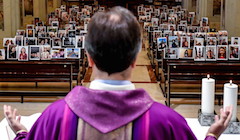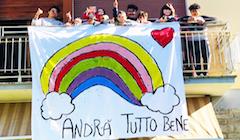An exigence is emerging in the minds of those who observe things with greater depth, two months after the beginning of this emergency phase. It is not to find ways to return to where we were, forgetting as quickly as possible this dramatic parenthesis, but to better understand the lesson it is giving us, to interpret its signs. It is a question of re-reading the human and believer experience in situations that cast a new light on problems that were on our agenda, but without priority.
The pandemic is putting our faith to the test and exhorts us to rediscover its essential core. For many centuries we have been accustomed to living, in our country, in religious abundance and complete freedom. And we have done so without striving to understand why this wealth has led to reducing attendance.
Our celebrations often remain an individual experience, nourished by a strong sacred connotation. And when, in exceptional situations, one is unable to live these liturgical experiences, one feels a sense of deprivation, almost as a spiritual good to which we are naturally entitled.
We would like to put 5 points to the reflection ;
1 – to be deprived of the possibility of celebrating the Eucharist for a long time places believers in a condition of absence of the community , the Eucharistic table. But it also opens up the great possibility of understanding the depth of the faith, because it is put to the test. “in silence there is the power of clarification, purification and understanding of the essential” Dietrich Bonhoeffer wrote in “Common Life”.
2 – silence and solitude can also be a great opportunity to listen to the Word, read within this situation, in which everyone reveals himsef in fragility and poverty, and discovers that there is a great hope of salvation. Some groups have chosen not to participate in Eucharistic celebrations online, but to share experiences of lectio divina, also rediscovering a new community dimension.
3 – this pandemic urges lay people and priests to think about new ways of living the experience of faith. Not only mass transmissions, but in a more substantial way, recognizing in the home and in the family a true ecclesial place, promoting domestic celebrations with extreme creativity. We could also go further, to experience encounters of spirituality open to those who are on the threshold of the ecclesial community.
4 – this laborious experience calls lay people to rethink our task as servants and announcers of the Word within the places of our lives, and raises many questions about the role of ordained ministries. This exceptional time has raised the need to appreciate all the responsibilities that are generated by Baptism.
5 – There is no Eucharist without washing the feet, without a relationship of closeness with the other, with the poor. Being obliged to keep distances calls us to rethink the meaning of the relationship. This is a metaphor for a radically different way of conceiving interpersonal relationships, politics, economics, international relations, the relationship with nature: to save myself I must pay attention to the other.
From Meic. Full text in Italian





Leave A Comment
You must be logged in to post a comment.